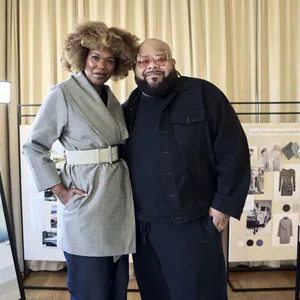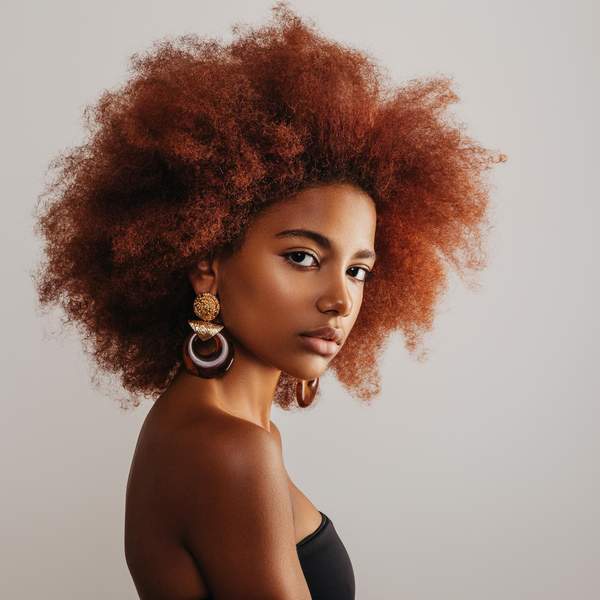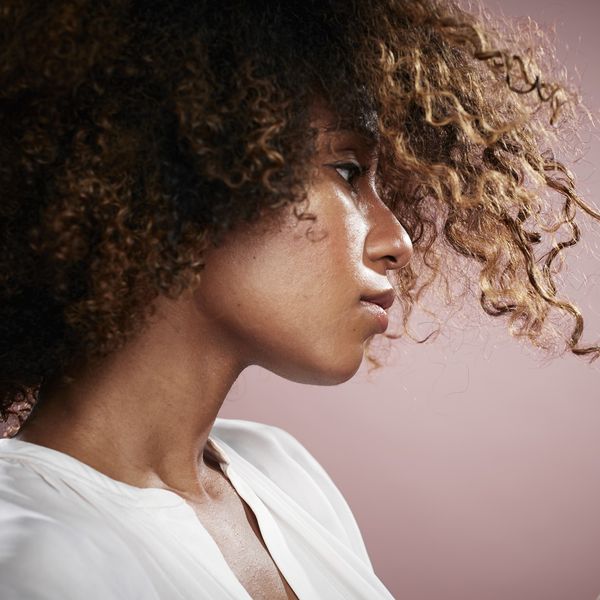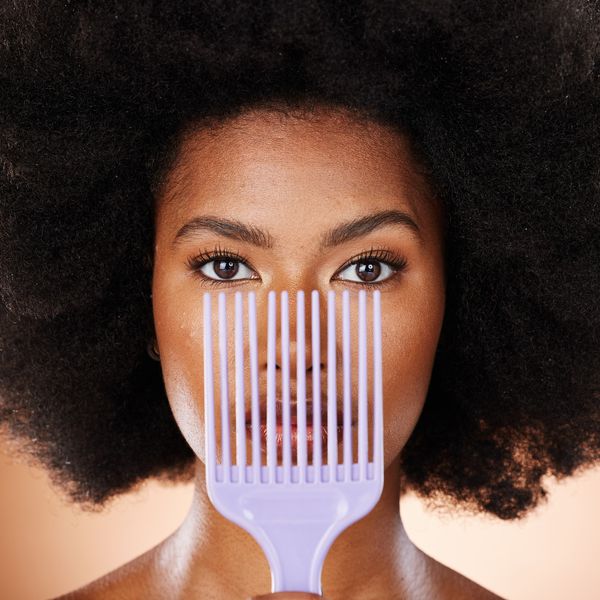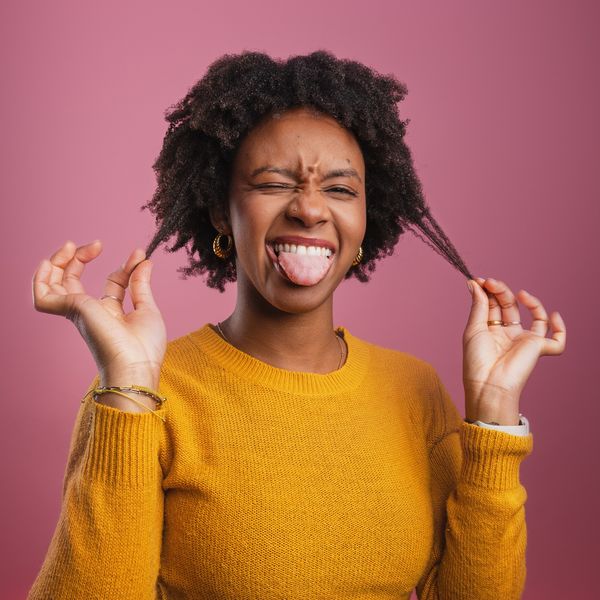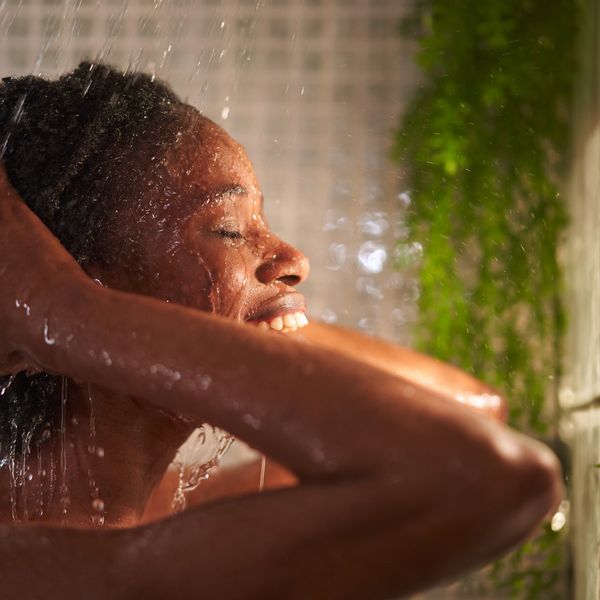Look, I already know that some people are probably gonna be all up in the comments section protesting how "irresponsible" this article is. I mean, how in the world can I promote anything that has—gasp—petroleum/mineral oil in it?! Don't I know that it clogs up hair follicles? Haven't I heard that it repels moisture? As a naturalista, how can I resort to something so low on the totem pole of hair products and then—gasp again—publicly write about it?
Uh-huh. I hear you. But before you try and cancel me, take a moment to look at the video below. That stunning Nigerian woman right there? On her socials (and YouTube channel), she goes by EfikZara and that outrageously gorgeous Afro? That is all hers, baby. Yeah, and do you see what she's holding in her hand? It ain't Aunt Jackie's or Shea Moisture; it's grease. Good old-fashioned hair grease. As I've been trying to figure out the perfect formula to get the natural hair results that I personally want, EfikZara is someone who has been influential in getting me to return back to what most of us used back in the day, thanks to her videos like "5 BIG LIES The Natural Hair Community LIED About GREASE!!" and "The TRUTH about GREASE + How I Use It To GROW Low Porosity 4c/4b/4a Hair".
Then, once I saw that there are more and more naturalista influencers who are rising up and singing grease's—more specifically, Blue Magic hair grease's—praises (you can check out a few good ones here, here and here), I was like, "Let me make a run right quick and cop me a jar" (which is more like a small tub).
The TRUTH about GREASE + How I Use It To GROW Low Porosity 4c/4b/4a Hair | EfikZarawww.youtube.com
And y'all, I can't believe I left what my hair clearly missed and loves.
Not to diss the commercial—emphasis on "commercial"—hair care community or their findings. But when something works for you, sometimes you need to buck the system and stick with that. Basically, just like Jasmine Saunders, author of "Two Reasons Why Petroleum Is Used in Hair Products", penned at the end of her piece—" If your favorite natural hair products contain mineral oil, and you are happy with the results they produce then there is no reason to stop using them. I would just keep in mind the occlusive nature of mineral oil and structure your hair regimen accordingly." Yes. That right there.
So, are you ready to read why it can't hurt to put a little Blue Magic back into your own hair care regimen? Let's do this.
It’s Inexpensive AF
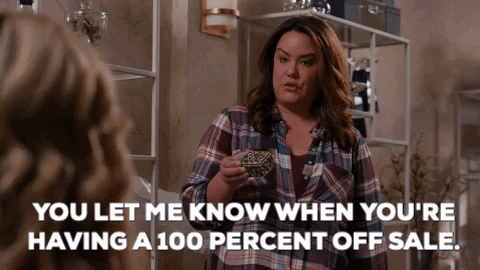
Again, since I'm going to assume that at least a couple of people in the natural hair care industry are going to read this and not be too happy about this endorsement, when it comes to the (sometimes horrendous) price tag that comes on some hair products, I'll leave specific names out. What I will share is a quote from an article on the topic that stated, "It is estimated that the natural hair care industry was worth $684 million in 2012 and was projected to reach $761 million by the end of 2017." Bottom line—hair care is a business and businesses love to make as much money as possible. Therefore, it shouldn't be shocking that even natural hair care lines would want to do all that they can to put more money into their pockets.
And indeed, what a lot of people who are returning to hair grease are saying is perhaps we were convinced or even "scared" to leave grease alone because while a 12 oz jar of Blue Magic costs me $3.99, I literally have some popular natural hair care items that are $35-40 for a 6-8 oz jar. Not only that, but the latter hasn't worked nearly as well as the former.
So yeah, if there's no other reason to consider grease—or grease again—the second to none price tag would definitely be a very valid one.
If You’ve Got High Porosity Hair, It’s the ULTIMATE Moisturizer
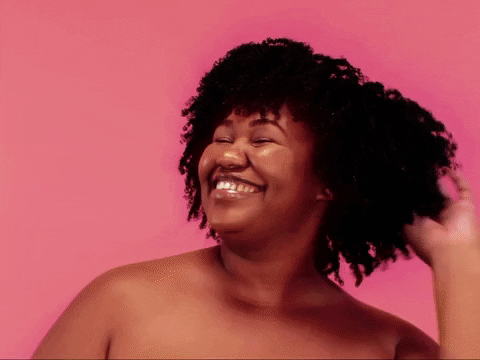
When it comes to length retention, what my own natural hair journey continues to teach me is if you don't know your own hair's porosity, you're probably not going to get (or keep) the inches that you seek. While I will probably do a full article on this at some point, if you're wondering what the difference between low, normal and high porosity hair is, I'll give a brief breakdown. When you have low porosity hair, that means your hair's cuticles are closed which makes it hard for moisture to get into your hair. Normal porosity means your hair gets and keeps moisture fairly well. Then there's my kind of hair; the hair that drinks up moisture with the quickness but two days later will look at me like it hasn't seen water in weeks. This happens with high porosity hair because there tends to be holes in the hair cuticle; this means that those of us who fall into this category have to be hyper-vigilant about keeping our tresses moisturized.
I'm telling y'all, I've tried creams, butters, the LOC method—you name it, and nothing has kept moisture in my hair longer than grease has. I literally wash my hair, deep condition it and while it's damp, apply some Blue Magic from root to tip and style. Afterwards, my hair remains soft and manageable until the next wash day (which for me is seven days later). The reason why is because there are two things that petroleum does for your hair. First, it locks in the moisture that you already have. Second, it prevents any more from getting in. The second point is why a lot of people claim that grease is bad for you. I'll get more into that in a sec.
It’s an Amazing Sealant
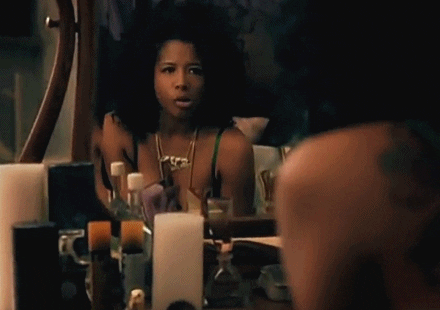
If you're someone who believes deep down in your soul that Black women—particularly Black women with 4-type hair—can't grow long hair, please take a moment to watch this video, this video, this video, this video and this video. Other ethnicities (or hair textures) don't have the upper hand when it comes to gaining inches. No matter who you are, you typically grow between ½" to 1" of hair a month. The reason why a lot of us don't see the length that we want is either because 1) our shrinkage makes us think that our hair isn't as long as it actually is or 2) we aren't taking good care of our ends. This is why it is essential that you seal the ends of your hair on a consistent basis.
Sealing is basically one of the most effective ways to prevent the ends of your hair (which is the oldest part of your hair) from becoming dry, brittle and developing split ends (which you can't repair; you always have to cut off). Even if the thought of applying grease to your entire head seems like a no-no to you, at least consider applying it to your ends. Remember, petroleum locks—or seals—in moisture and the more protected your ends are, the easier it will be for you to see six inches of progress by the end of the year.
Grease Isn’t “Bad” for You. It’s All About Using It Properly.
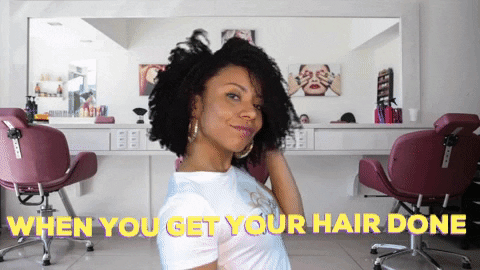
So, why is it that so many people frown upon good ole' hair grease? Why do a lot of them say that all it does is weigh their hair down, leave grease stains and actually result in hair being drier than ever? Don't blame that on the grease; blame that on not applying it properly. Since grease provides a barrier, it's not really the best idea to apply it to dry hair. You will get the best results if your hair is wet, has already been conditioned and you apply a leave-in condition before putting the grease on top of it. All of this might sound like a lot at first (sometimes it feels like it too) but trust me, as your hair dries, it will go from feeling "heavy" to feeling really soft and smooth. You just always have to keep in mind that since petroleum seals, it will keep the moisture that your hair has in, but it will also keep new moisture from penetrating. That's why oiling your hair with grease every day is usually counterproductive. Since your tresses are already dry, the grease isn't doing it much good.
And what about greasing your scalp? Eh. I don't use grease for that but some naturalistas sing its praises for soothing their scalp when they apply it on wash day. My take is to remember that your scalp is skin. If your skin doesn't show out when you apply Vaseline (which is also petroleum) then your scalp probably won't either. Still, I think it would be best to not apply grease to your scalp when your scalp is dry; seems like it would leave more residue than you are bargaining for if you do.
Your Mama (or Auntie) Used It When You Were a Child…Right?
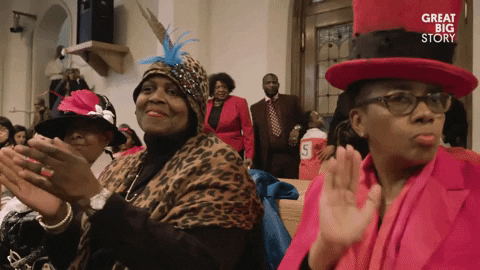
Hmph. I don't know about y'all, but I have some very distinct memories of being a little girl, sitting in front of a stove and getting my hair pressed with some good old-fashioned hair grease. You know what else I recall? My hair having some real length to it too. That's why I think the saying, "If it ain't broke, don't fix it" certainly applies here.
Listen, by no means am I saying that you should toss your natural hair products or go on a personal boycott of popular commercial brands. My point is simply that grease IS NOT the devil and if it has personally worked for you in the past, I don't see why you should stop using it now. Because, again, do you see EfikZara's hair in the feature shot? Blue Magic helped to get her there. That's enough for me to add it to my regimen. And I have. And it's been all good on the mane tip ever since. My hair thanks me. My wallet does too.
Want more stories like this? Sign up for our newsletter here and check out the related reads below:
7 Essential Oils All Naturalistas Need For Their Hair
10 Things Your Natural Hair Needs In The Winter
These Foods Will Give Your Skin & Hair The Moisture They Crave
Feature image by Getty Images
- No Lye - Why You Should Think Twice About Relaxing Your Hair ... ›
- Best Wash Day Routine, Natural Hair - xoNecole: Women's Interest, Love, Wellness, Beauty ›
- Why Won't My Natural Hair Grow? - xoNecole: Women's Interest, Love, Wellness, Beauty ›
- Do Vitamins For Hair Growth Work? - xoNecole: Women's Interest, Love, Wellness, Beauty ›
- Tips To Maintain Your Natural Hair This Winter - xoNecole: Women's Interest, Love, Wellness, Beauty ›
- What Your Hair Needs In Winter Cold Weather - xoNecole: Women's Interest, Love, Wellness, Beauty ›
- How To Grow Your Hair Fast, Faster Hair Growth - xoNecole: Women's Interest, Love, Wellness, Beauty ›
- Top Products For High-Porosity Natural Hair - xoNecole: Women's Interest, Love, Wellness, Beauty ›
- Best Hair Products For Low Porosity Hair - xoNecole: Women's Interest, Love, Wellness, Beauty ›
- How To Use Hair Oil For Hair Growth - xoNecole ›
- Is Grease REALLY Bad for Natural Hair? | Natural Hair Rules!!! ›
- Dr. B. Davis says: Everyone Else's Hair is growing...Are Hair Grease ... ›
- How to Use Hair Grease | CurlyNikki | Natural Hair Care ›
- How Hair Grease (Yes, Grease!) Can Help Retain Length in Natural ... ›
- What You Should Do If You Use GREASE in Your Natural Hair ... ›
- How Hair Grease (Yes, Grease!) Can Help Retain Length in Natural ... ›
- Hair Grease for Natural Hair? Blue Magic-Does it Work - YouTube ›
- The 24 Best Products for Natural Hair ›
- The Natural Hair Community LIED About GREASE!! | Lipstick Alley ›
- Why I Finally Broke Up With The Natural Hair Community - Fashionista ›
- the unspoken PROBLEM in the Natural Hair Community we NEED ... ›
- 5 Unwritten Rules of the Natural Hair Community | NaturallyCurly.com ›
- 5 BIG LIES The Natural Hair Community LIED About GREASE ... ›


